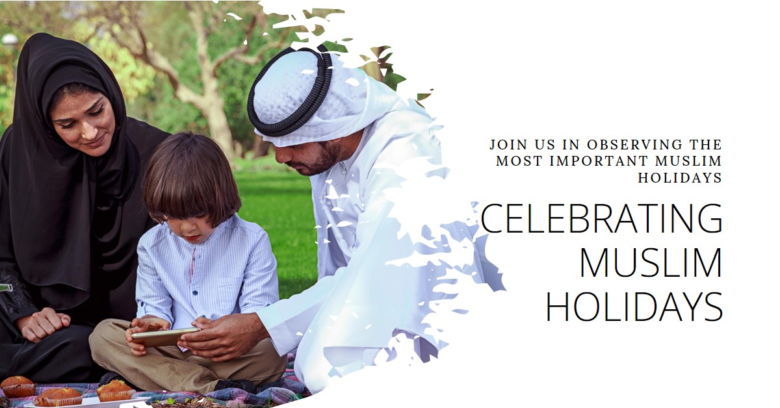Introduction
Muslim holidays are deeply rooted in the faith and traditions of Islam, commemorating significant events and embodying spiritual values. These holidays are observed by millions of Muslims around the world, each with its unique customs and practices. This article provides an overview of the major Muslim holidays, their historical significance, and how they are celebrated.
Eid al-Fitr: The Festival of Breaking the Fast
Historical Significance
Eid al-Fitr marks the end of Ramadan, the holy month of fasting. The name “Eid al-Fitr” translates to “Festival of Breaking the Fast.” It is a time of joy and celebration, occurring on the first day of Shawwal, the tenth month of the Islamic lunar calendar. The holiday commemorates the completion of an important religious duty—fasting during Ramadan—and is a time for gratitude and communal harmony.
Celebrations and Customs
The celebrations begin with a special prayer known as Salat al-Eid, performed in congregation at mosques or open prayer grounds. Muslims wear their finest clothes, often new or specially prepared for the occasion. The day starts with a communal breakfast, traditionally featuring sweets, hence it’s also known as the “Sweet Eid.”
Giving to charity, known as Zakat al-Fitr, is an integral part of Eid al-Fitr. Muslims make donations to help those in need, ensuring everyone can participate in the celebrations. Families and friends gather to share festive meals, exchange gifts, and extend greetings of “Eid Mubarak,” meaning “Blessed Eid.”
Eid al-Adha: The Festival of Sacrifice
Historical Significance
Eid al-Adha, or the “Festival of Sacrifice,” is observed approximately 70 days after Eid al-Fitr, during the Islamic month of Dhu al-Hijjah. It coincides with the annual Hajj pilgrimage and commemorates the willingness of Prophet Ibrahim (Abraham) to sacrifice his son Isma’il (Ishmael) in obedience to God’s command. According to Islamic tradition, God intervened and provided a ram to be sacrificed instead.
Celebrations and Customs
The day begins with Salat al-Eid, similar to Eid al-Fitr. The central ritual of Eid al-Adha is the Qurbani, the sacrifice of an animal such as a sheep, goat, cow, or camel. The meat is divided into three parts: one-third for the family, one-third for relatives and friends, and one-third for the needy.
Eid al-Adha is a time for visiting family and friends, sharing meals, and giving to those less fortunate. Muslims around the world gather for large communal prayers and celebrations, often lasting several days.
Ramadan: The Holy Month of Fasting
Historical Significance
Ramadan is not a holiday in itself but a sacred month in the Islamic calendar. It is the ninth month and is observed by fasting from dawn to sunset. Ramadan commemorates the first revelation of the Quran to Prophet Muhammad, making it a time of heightened spirituality and worship.
Practices and Observances
During Ramadan, Muslims fast from food, drink, and other physical needs during daylight hours. The fast, known as Sawm, is one of the Five Pillars of Islam. Muslims engage in increased prayer, recitation of the Quran, and charitable activities.
The fast is broken each day with a meal called Iftar, often starting with dates and water, followed by a larger meal. Suhoor, a pre-dawn meal, is consumed before the fasting begins each day.
Other Important Observances
Islamic New Year
The Islamic New Year, or Hijri New Year, marks the beginning of the new Islamic lunar year. It commemorates the Hijra, the migration of Prophet Muhammad and his followers from Mecca to Medina. It is a time for reflection and prayer.
Mawlid al-Nabi
Mawlid al-Nabi celebrates the birth of Prophet Muhammad. It is observed on the 12th day of Rabi’ al-awwal, the third month of the Islamic calendar. Celebrations vary widely but often include recitations of poetry and stories about the Prophet’s life, special prayers, and communal meals.
Conclusion
Muslim holidays are rich in tradition and spiritual significance, reflecting the core values of Islam such as charity, community, and devotion. These holidays provide an opportunity for Muslims to come together in worship, reflection, and celebration, strengthening their faith and bonds with each other. Through understanding these holidays, we can appreciate the depth and beauty of Islamic culture and tradition.
Also visit:
CR7 Wallpaper: Celebrating the Legacy of Cristiano Ronaldo



